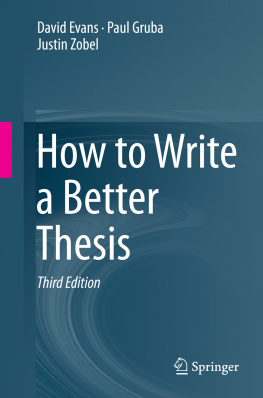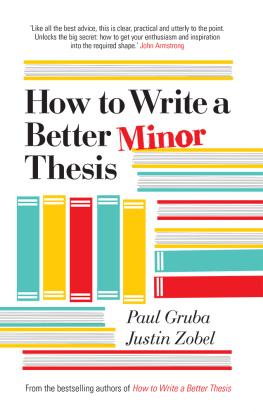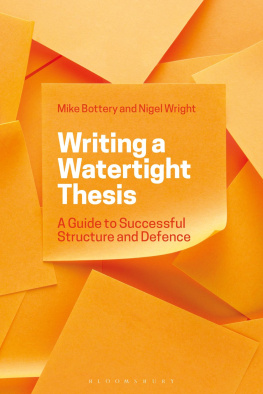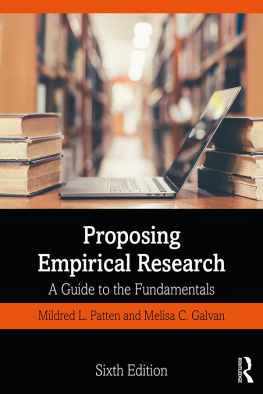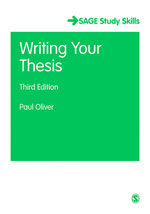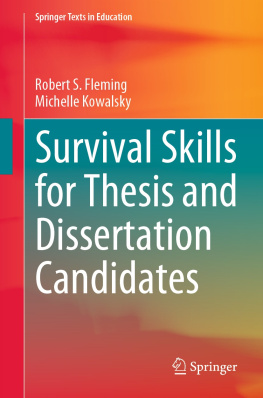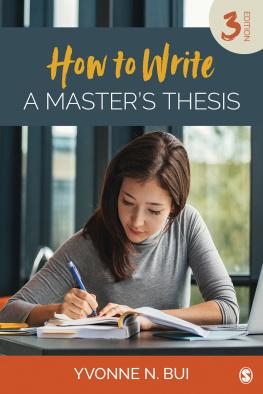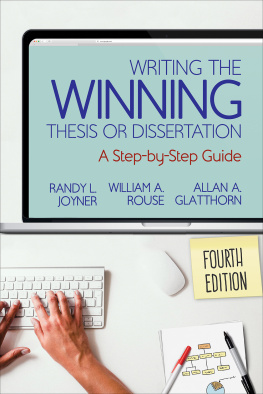1. What Is a Thesis?
Abstract
Simply defined, a thesis is an extended argument. To pass, a thesis must demonstrate logical, structured, and defensible reasoning based on credible and verifiable evidence presented in such a way that it makes an original contribution to knowledge, as judged by experts in the field. Among the many types of scholarly productions, theses are an oddity: each one is different, and there are no standard or generic constructions. Most of those who supervise theses have written just one, and, despite the effort they take to produce, the only people who carefully read a given thesis are the project supervisors, the examiners, and an otherwise rather select audience of specialized academics.
Simply defined, a thesis is an extended argument. To pass, a thesis must demonstrate logical, structured, and defensible reasoning based on credible and verifiable evidence presented in such a way that it makes an original contribution to knowledge, as judged by experts in the field. Among the many types of scholarly productions, theses are an oddity: each one is different, and there are no standard or generic constructions. Most of those who supervise theses have written just one, and, despite the effort they take to produce, the only people who carefully read a given thesis are the project supervisors, the examiners, and an otherwise rather select audience of specialized academics .
From the start, it is good to have a solid idea of what a thesis is , and perhaps the best place to start a discussion of theses is with their purpose. What do examiners look for when they judge your work?
Criteria for Examination
When universities send out a thesis for examination, they include their suggested guidelines for the examiners. I recommend that you get a copy of these guidelines from your own university (they are almost certainly available online) and look them over carefully. Make an effort, too, to understand the process of submission and examination .
At my university, the University of Melbourne < unimelb.edu.au >, the guidelines begin by listing key attributes of a successful thesis (quoted from the universitys School of Graduate Research website, as of November 2010) :
Attributes of a Successful Thesis
The thesis demonstrates authority in the candidates field and shows evidence of command of knowledge in relevant fields .
It shows that the candidate has a thorough grasp of the appropriate methodological techniques and an awareness of their limitations .
It makes a distinct contribution to knowledge.
Its contribution to knowledge rests on originality of approach and/or interpretation of the findings and, in some cases, the discovery of new facts.
It demonstrates an ability to communicate research findings effectively in the professional arena and in an international context.
It is a careful, rigorous and sustained piece of work demonstrating that a research apprenticeship is complete and the holder is admitted to the community of scholars in the discipline.
At first glance these guidelines may appear to refer to the thesis, but they are really about the candidate. The first point makes this explicit: The thesis demonstrates authority in the candidates field. And consider the last point. The examiner has to consider whether the thesis is a careful, rigorous and sustained piece of workbut see how it goes ondemonstrating that a research apprenticeship is complete and the holder is admitted to the community of scholars in the discipline.
At the start of introductory seminars in thesis writing, I ask students to explain the purpose of a thesis. Often they say something like, To tell people in my area about my research. No doubt your research is of interest, but your primary purpose in writing a thesis is to pass an examination. These examiners are not reading your work out of mere interest: from the above criteria, we see that examiners read your thesis to assess whether or not you have demonstrated your fitness to be admitted to a community of scholars. Because a written thesis is an examination paper, not simply a report of research findings, you need to understand what examiners are looking for when they read your work. In the case of doctoral theses, examiners are encouraged to consider eight questions (quoted from the same website) :
Guidelines for Examiners
Does the candidate show sufficient familiarity with, and understanding and critical appraisal of, the relevant literature ?
Does the thesis provide a sufficiently comprehensive investigation of the topic?
Are the methods and techniques adopted appropriate to the subject matter and are they properly justified and applied?
Are the results suitably set out and accompanied by adequate exposition and interpretation ?
Are conclusions and implications appropriately developed and clearly linked to the nature and content of the research framework and findings?
Have the research questions in fact been tested?
Is the literary quality and general presentation of the thesis of a suitably high standard ?
Does the thesis as a whole constitute a substantive original contribution to knowledge in the subject area with which it deals?
These questions really are about the thesis rather than the candidate. They roughly parallel the structure of a solid thesis , and each builds on the previous one .
The first two questions are about familiarity with the previous work in your field and the demonstration of a critical approach to it. Note that, from the start, having and demonstrating a critical attitude towards your subject sets the tone of your interactions with the examiners .
The third question is about choosing appropriate research methods and justifying your choices as appropriate to the topic . Be aware that it is you, at this point, who must set the scope of that topic that will determine the appropriateness of a methodology . Further, the third question alerts examiners to show concern for the manner in which the methods are applied.
The fourth question focuses on displaying the results, explaining them and showing that you know what they mean. Here, then, it is not simply a question of showing those in the discipline area what you have found but also that you know how to present the results.
The fifth and sixth questions remind examiners to check the alignment, and connections, between an initial aim and the final conclusions. The logic flow in the thesis must be right. Notice, too, the emphasis on linking your interpretations back to what you said you would do earlier in the thesis.
The seventh question invites the reader to step away from the empirical side of the study to consider how well you can write. In a sense, the question signals to both you and the examiners just how important it is to be able to be able to communicate well within the international research community.

